Subscriber Benefit
As a subscriber you can listen to articles at work, in the car, or while you work out. Subscribe NowThe Exoneration Justice Clinic at Notre Dame Law School has been up and running for three years and has grown to the point of opening its doors to students from outside the Hoosier State — and even outside the country.
In June, two students from Strathmore Law School in Nairobi, Kenya, interned at the clinic for two weeks.
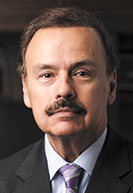
The schools have a memorandum of understanding, and when Strathmore’s associate dean for international affairs visited Notre Dame, it sparked an interest because the Kenyan school also has a criminal justice clinic.
“The associate dean went back and identified a couple of students that they thought would be good candidates to come and spend some time with us, and they arrived in early June and were here for over two weeks,” Jimmy Gurulé, a Notre Dame Law professor and faculty director of the Exoneration Justice Clinic, said. “And they were treated like any other student.”
The two students — Irene Agingu and Esther Kangai — learned about the EJC’s approach to selecting cases and the process for investigating wrongful convictions. They also accompanied clinic staff to court and to prison for a client visit.
The clinic looks for cases in which a person claims they are innocent, and it assess if there are viable avenues of investigation. Gurulé said they mainly have cases in Indiana but are also working in Ohio and Texas.
“The first week was a bit challenging because we were getting acquainted with the legal system here in America, but we got the hang of it,” Kangai said in a news release.
One of the differences between the American and Kenyan criminal justice systems is that in Kenya, there are no jury trials.
“It was quite interesting to learn more about the U.S. criminal justice system — working on intake cases, visiting court, going to prison,” Agingu said in the news release.
Gurulé said he hopes to have more Strathmore students come to Notre Dame Law next summer. The clinic is also partnering with students in other parts of the U.S.
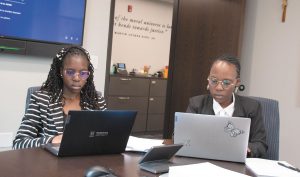
Undergrad experience
Another partnership the EJC has is with St. Olaf College in Northfield, Minnesota, which works with Notre Dame Law to give undergrads a taste of exoneration work.
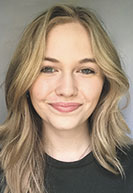
One such undergrad is Else Madsen, an incoming junior at St. Olaf who has spent her summer interning at the South Bend clinic.
Madsen said she heard about the clinic from her college and decided it would be a good opportunity for her, given that she was on the fence about going to law school.
“I’ve always had this interest in the legal field, but I was really fascinated by reentry work, which kind of sits at this nexus of law and social work,” Madsen said.
At the clinic, Madsen participated in the investigation side of the EJC’s work, meaning she joined staff in efforts to locate witnesses.
While she still needs to do some research, she said she is feeling a pull toward law school.
“It’s been a really incredible experience so far and (has) far surpassed what I was hoping for this summer,” Madsen said.
She added, “I’m hoping to stay involved because there really is a strong tie and it’s hard, once you get in and get involved, to not remain invested in everything that’s happening.”
Law school experience
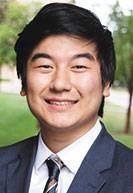
Within its own school, the EJC will welcome seven rising 3Ls in the upcoming school year who are returning to the clinic as legal interns.
Hubert Ning is one of the seven students who will be able to practice in a courtroom on behalf of the clinic’s clients, and he said he is excited to do so. One of his friends had the opportunity to address the court and present an opening as part of the clinic.
“I always go back to like, this is a real thing I’m working on, so that’s 100% a really cool aspect of it,” Ning said. “And there’s a lot of good mentorships in the program, which I really appreciate.”
Last year, the clinic hosted nine legal interns.
“We had one of our students last semester argue a motion before a Superior Court judge in Elkhart County,” Gurulé said. “We look for opportunities to get them in the courtroom. We want to make sure that the motion is one that we think that they’re capable of handling and doing an adequate job. We engage in extensive preparation to prepare the students to argue whatever issue the pretrial motion is before the court. But students are really anxious and very excited to have that opportunity.”
A total of 20 students will be participating in the clinic in the fall 2023 semester, he said.
Coming back
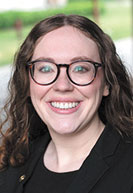
Lenora Popken, a 2020 graduate of Notre Dame Law, returned to the clinic as a legal fellow in June. Popken was involved with the Notre Dame Exoneration Project and the Wrongful Conviction Externship while in law school.
One of her clients was Andy Royer. Royer, who is in his mid-40s but is described as having “the mind of a child,” spent 17 years in prison for a murder for which he was later exonerated.
Popken was there the day Royer was released from prison in 2020. It had been discovered that he gave a false confession after being coerced by a police officer, among other evidence that pointed to his innocence.
“To just play a small part in correcting such a grave miscarriage of justice was just — it’s just an honor,” she said.
Popken noted the EJC’s clients generally aren’t angry about their situations.
“I think I would be angry if I was in prison for a murder I didn’t commit and it steals 20 years of my life. I would be mad,” she said. “But most of our clients forgive the people that have done this to them. And I think that just is such a display of the strength of the human spirit.”
After she graduated, Popken was a staff attorney for the 11th Circuit Court of Appeals, but she said she missed the advocacy work.
“I’m definitely more comfortable now that I’m back in kind of an advocacy role where I feel like I can kind of fight for the correct outcome,” she said.
She now gets to guide students through analyzing exoneration cases and assists in investigation and litigation. Her fellowship is for two years, but she said she hopes she can stay for as long as they will have her.•
Please enable JavaScript to view this content.
